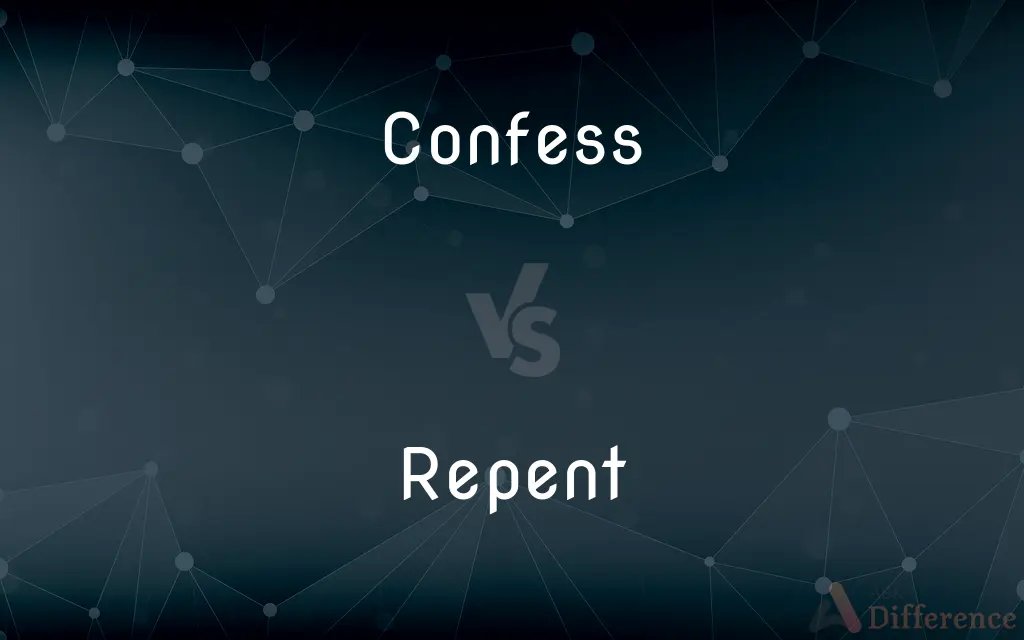Confess vs. Repent — What's the Difference?
By Urooj Arif & Maham Liaqat — Published on February 26, 2024
Confess involves admitting wrongdoing, often to another person, while repent involves feeling remorse and changing one’s behavior as a result of that admission.

Difference Between Confess and Repent
Table of Contents
ADVERTISEMENT
Key Differences
Confessing is about acknowledging one's mistakes or sins, typically to someone else, which can be a step towards seeking forgiveness. It's an act of honesty and disclosure, often seen in legal or religious contexts. For example, one might confess to a crime to authorities or admit a personal fault to a confidant.
Repentance, on the other hand, goes beyond mere acknowledgment. It encompasses feeling genuine remorse for one's actions and making a committed decision to change for the better. In religious traditions, repentance is often linked to spiritual growth and redemption, signifying a deeper internal transformation than confession alone.
Confession can be a part of repentance, while the latter implies a more comprehensive process that includes not only admitting wrongdoing but also actively seeking to rectify it and avoid future transgressions. This distinction highlights the difference in scope and depth between the two terms.
The act of confessing can be immediate and specific, relating to a particular deed or thought. It's often a prerequisite for repentance, serving as the moment of acknowledgment that precedes the journey towards change. In this sense, confession can be seen as the first step in the broader process of repentance.
Repentance, in contrast, is an ongoing process that might begin with a confession but extends into continuous self-assessment and behavior modification. It's not just about making amends for past actions but also about fostering a new way of living that avoids the mistakes of the past. This dynamic nature of repentance sets it apart from the more static act of confession.
ADVERTISEMENT
Comparison Chart
Definition
Admitting to wrongdoing or sins, often to another person.
Feeling remorse for one's actions and making a change in behavior.
Focus
Acknowledgment of specific actions or thoughts.
Sorrow for actions and a commitment to behavioral change.
Context
Often used in legal, personal, and religious settings.
Primarily seen in moral and religious contexts.
Process
Can be a singular event or action.
An ongoing process involving continuous self-improvement.
Outcome
Leads to disclosure and possibly forgiveness.
Aims at personal transformation and avoiding future wrongdoing.
Compare with Definitions
Confess
To admit guilt or wrongdoing.
He confessed to taking the money from the drawer.
Repent
To feel remorse for past conduct.
He repented for his harsh words.
Confess
To declare one's sins to a priest for absolution.
He went to confess his sins before communion.
Repent
To express sincere regret or remorse about one's wrongdoing.
They repented for their actions and sought to make amends.
Confess
To admit to something embarrassing.
She confessed to never having seen a classic film.
Repent
To change one's mind or ways as a result of regret.
After the incident, she repented and volunteered at the community center.
Confess
To disclose personal feelings or secrets.
She confessed her love in a heartfelt letter.
Repent
To undergo a change of heart and behavior.
After much reflection, she repented and mended her relationships.
Confess
To acknowledge a belief or faith openly.
They confessed their faith in front of the congregation.
Repent
To turn away from sin and dedicate oneself to the amendment of one's life.
He repented and decided to lead a more honest life.
Confess
To acknowledge belief or faith in; profess.
Confess one's religion.
Repent
To change the mind, or the course of conduct, on account of regret or dissatisfaction.
Lest, peradventure, the people repent when they see war, and they return to Egypt.
Confess
To disclose (something damaging or inconvenient to oneself); admit.
Repent
To feel such regret for past conduct as to change one's mind regarding it.
Repented of intemperate behavior. You'd better accept their offer before they repent.
Confess
To make confession; to disclose sins or faults, or the state of the conscience.
Every tongue shall confess to God.
Repent
To be sorry for sin as morally evil, and to seek forgiveness; to cease to practice sin and to love.
Confess
To admit to the truth, particularly in the context of sins or crimes committed.
I confess to spray-painting all over that mural!
I confess that I am a sinner.
Repent
Feel remorse for; feel sorry for; be contrite about.
Repent
To feel remorse, contrition, or self-reproach for what one has done or failed to do; be contrite.
"[He] liked to visit prisoners and admonish them to repent of their ways" (Adam Hochschild).
Repent
To feel regret or sorrow; - used reflexively.
My father has repented him ere now.
Common Curiosities
What does repentance involve?
Repentance involves feeling remorse for one's actions and making a sincere effort to change behavior and avoid repeating the mistake.
Is confession necessary for forgiveness?
In many religious and moral contexts, confession is seen as a necessary step toward forgiveness, but this can vary based on the situation and belief system.
Is confession always related to sin?
No, confession can relate to any admission of facts or feelings, not just sins.
Is repentance a one-time event?
No, repentance is an ongoing process of self-improvement and making amends.
Can you repent without confessing?
While repentance typically begins with confession, it's theoretically possible to feel remorse and change without formally admitting wrongdoing.
What does it mean to confess?
Confessing means admitting to something, often a wrongdoing or a personal truth, to oneself or others.
Can a person confess without feeling guilty?
Yes, a person can confess to an action without feeling guilty, especially if they don't believe the action was wrong.
Do all cultures view confession and repentance the same way?
Views on confession and repentance vary widely across different cultures and religions.
Can repentance affect personal relationships?
Yes, genuine repentance can restore trust and mend relationships damaged by past actions.
What is the role of confession in therapy?
In therapy, confession can be a tool for acknowledging feelings and experiences, leading to healing and growth.
How does one show repentance?
Repentance is shown through a change in behavior, making amends, and taking actions that demonstrate remorse and a commitment to change.
Is there a legal aspect to confession?
Yes, in legal contexts, confession can lead to legal consequences but also potentially mitigate penalties.
Is it possible to force genuine repentance?
Genuine repentance cannot be forced; it must come from sincere remorse and a personal commitment to change.
How do confession and repentance relate to accountability?
Both involve taking responsibility for one's actions, but repentance also includes taking steps to make amends.
Can one repent for thoughts as well as actions?
Yes, repentance can involve remorse and change related to both thoughts and deeds.
Share Your Discovery

Previous Comparison
Este vs. Esta
Next Comparison
C5 Plane vs. C17 PlaneAuthor Spotlight
Written by
Urooj ArifUrooj is a skilled content writer at Ask Difference, known for her exceptional ability to simplify complex topics into engaging and informative content. With a passion for research and a flair for clear, concise writing, she consistently delivers articles that resonate with our diverse audience.
Co-written by
Maham Liaqat















































